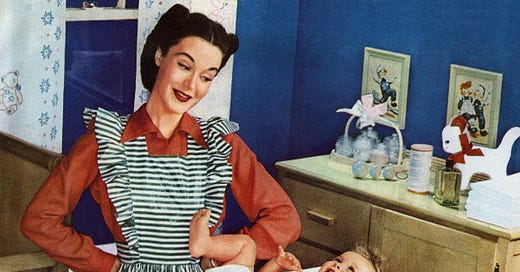The latest ‘discourse’ around motherhood sure sounds familiar. American women, we’re told, are “leaning out,” not having enough children, and not having them early enough in their lives. Oh and child care? It’s not good for kids so one parent should definitely stay home. (I’m sure you can guess which parent they mean.)
It’s frustrating to be 42 years-old and see the same conversations happen over and over again with few signs of progress. It’s especially infuriating when it’s clear why these issues are re-emerging: Since the pandemic started, 2.5 million women have left the workforce, and sexist culture is putting a rosy stay-at-home sheen on a shit-show.
This is a national emergency, one that will roll back women’s gains in the public sphere by decades—and the response has somehow become about how moms want to be home with their kids anyway. A record number of women have been pushed out of their careers, perhaps irrevocably, but we’re meant to believe that women are fine. Relieved, even. It’s obscene.
There’s been no comprehensive look at how fathers failed to step up, even when their wives’ jobs were on the line; nor has mainstream media really grappled with how much of a ‘choice’ it is to stay home when your partner won’t do child care or your kids’ school is closed.
Instead, we’re stuck talking—again—about the supposed benefits of women leaving work. Now, not everyone loves their job. But why, then, isn’t the conversation about making workplaces better rather than women just abandoning them? (Also if your job is underpaid and thankless, I have some news for you about motherhood.)
Most importantly: If staying at home with children is so important and rewarding, why don’t men do it? We all know the answer.
The truth is that leaving the workforce hurts women. Stay-at-home moms are more likely to be depressed, isolated, and economically vulnerable. And instead of offering financial and systemic support to these mothers, mainstream culture tells them that they should feel fulfilled and fortunate to do “the most important job in the world.” This ensures that women who don’t feel particularly lucky to be working 24/7 changing diapers and wiping noses are often too ashamed to say anything about it.
Pushing women to stay home doesn’t just hurt those who leave work. Women who remain in their jobs are also harmed by attitudinal shifts that say families are better off with traditional structures. Men with stay-at-home wives are more likely to have negative views of women who work, for example; and we’re already seeing that younger and supposedly ‘progressive’ men have increasingly regressive beliefs about women’s role at home.
I’m also quite over the idea that it’s just fine if women are erased from public life. I don’t want to live in a country where women’s voices aren’t fully represented in every industry—whether it’s government, media, banks, schools or movie studios. When women aren’t in the room we end up with a world built for men.
So let’s be clear: Women aren’t leaving the workforce because they want to. They’re leaving because America has put women, mothers especially, in an impossible situation. They’re leaving because their male partners didn’t do their fair share.
And despite the culture’s best effort to slickly reimagine this moment as one born of women’s ‘choices’, the truth is far simpler: American women are being gaslit. Being pushed out of our careers is not a good thing, and it is absolutely possible to be a happy working parent, even now. How do I know that parents can ‘have it all’? That it’s actually completely feasible to work and take care of children without giving up your career goals or life ambitions?
Because men do it all the time.
If you like this column, please subscribe & get pieces like this in your inbox every week!





and if you think your job is underpaid and thankless, and you've got news about motherhood, wait till you become the elder-caregiver, because women are expected to do that, too, by default.
I absolutely agree - with everything.
First: 'the most important job in the world'.
You can argue the Hell out of that but let's go with it. So, isn't it the conservative crowd who always claim that the managers in the private sector deserve their big salaries & bonuses because they are uniquely qualified to do these important jobs - and if women are uniquely qualified to do the even bigger Most-Important-Job-In-the-World, where are their seven figure salaries & bonuses? (Yes, we know the answer.)
As for individual men; I'm bitter and angry and so-fucking-tired-of-this-bullshit but not at all surprised. People like their privileges. Ask most people if they want better welfare & healthcare and they say 'Yeah, good idea' but they don't want to pay any extra tax themselves to achieve it. People like the idea of a clean environment but not if they can't drive their car everywhere or fly five times a year (for whatever reason) or even wear a goddamn sweater or coat instead of turning on the outdoor heater... et fucking cetera.
So most individual men will not lift a finger (doing the cooking or the washing up or even playing with their own goddamn children) to help their partners, let alone take a hit professionally.
Time for hard truths: most men don't find their partners and their hopes and happiness and ambitions all that important. Sure, they love their wives and girlfriends, as long as it's not too much effort. You know, all those fuckheads who throw no longer wanted or too troublesome pets out of the car? That's, in only VERY slightly hyperbolic terms, your average guy when it comes to their partners.
All right, end of rant - but Jesus, this shit pisses me off.